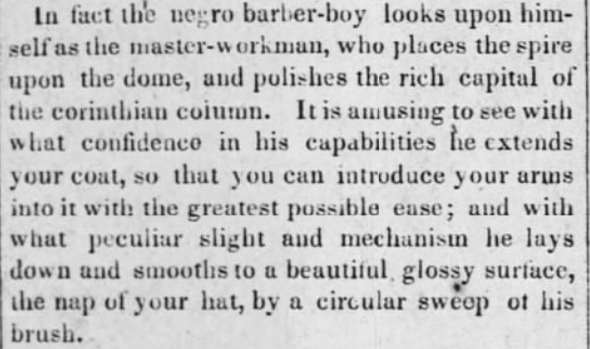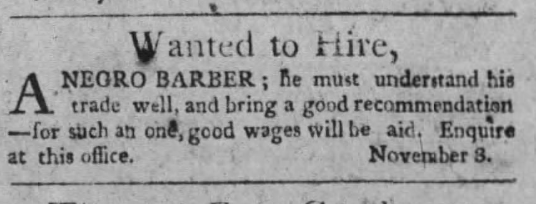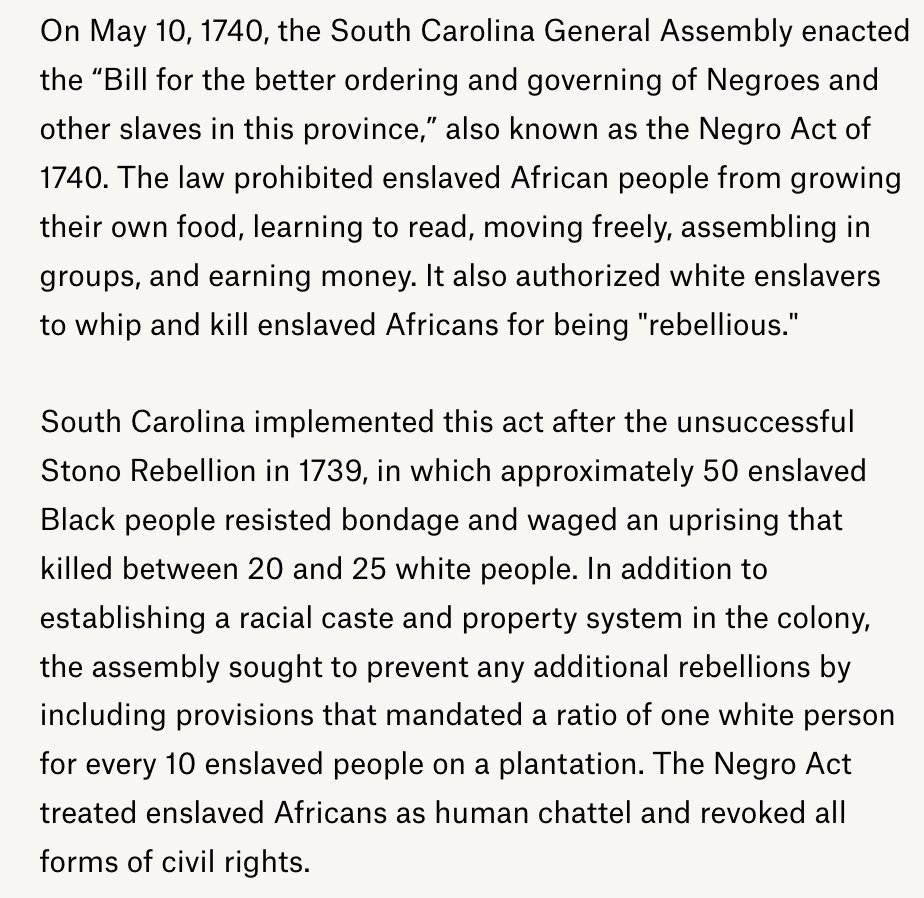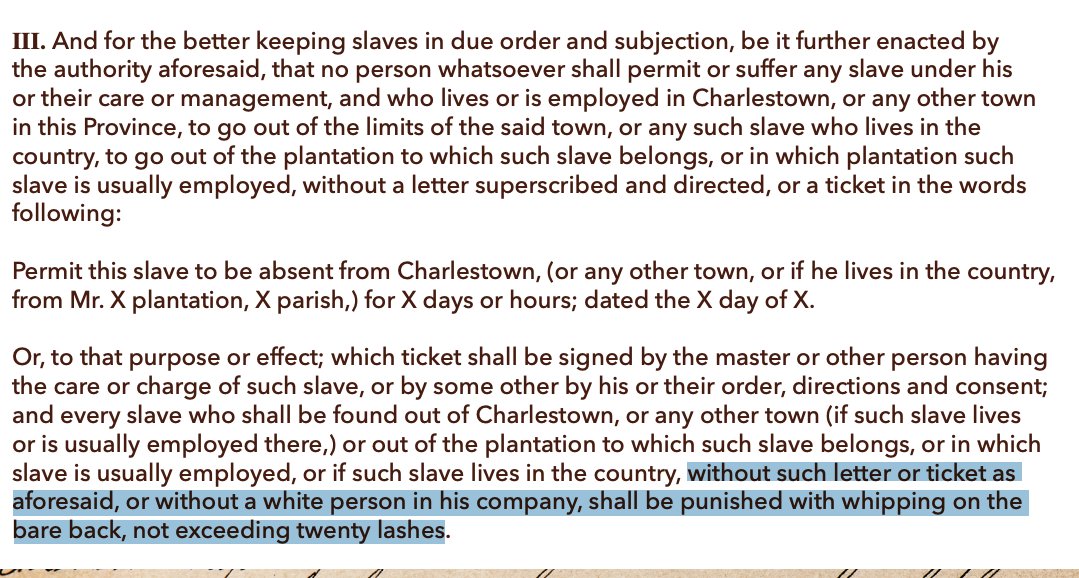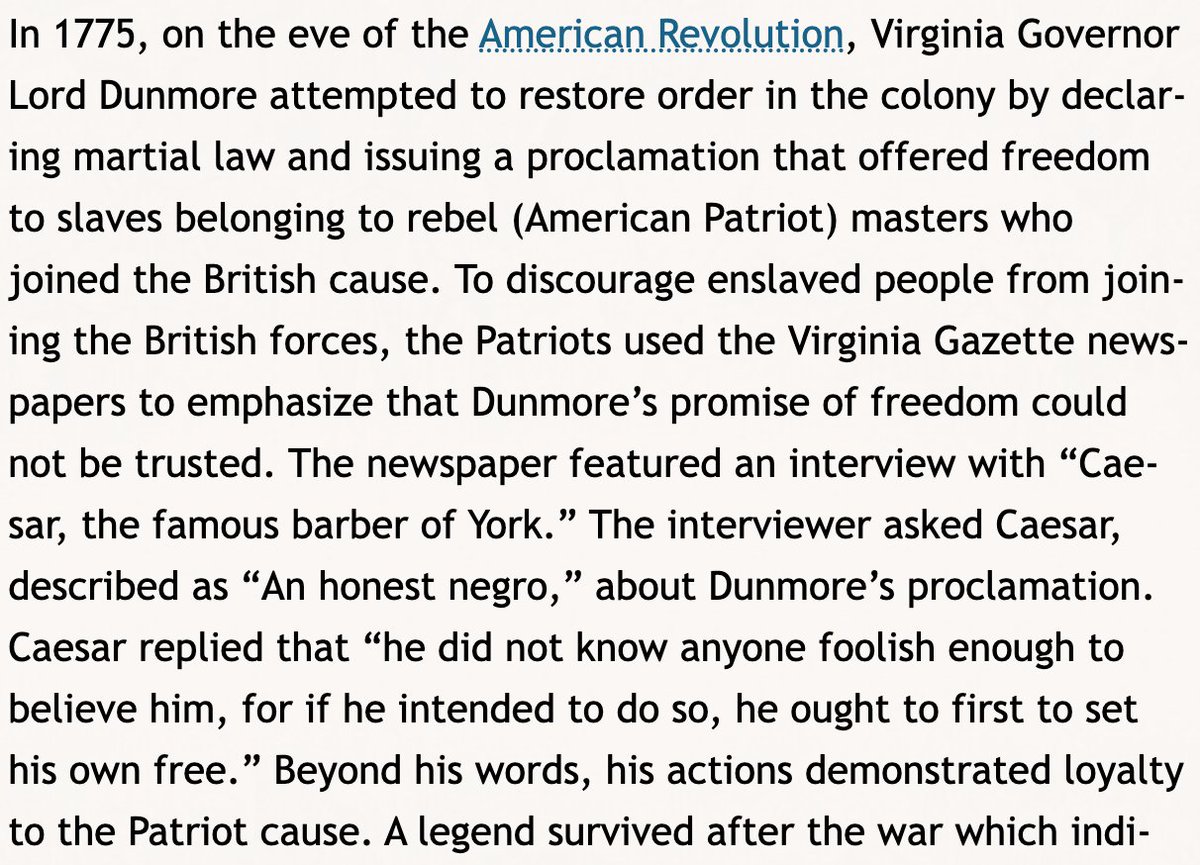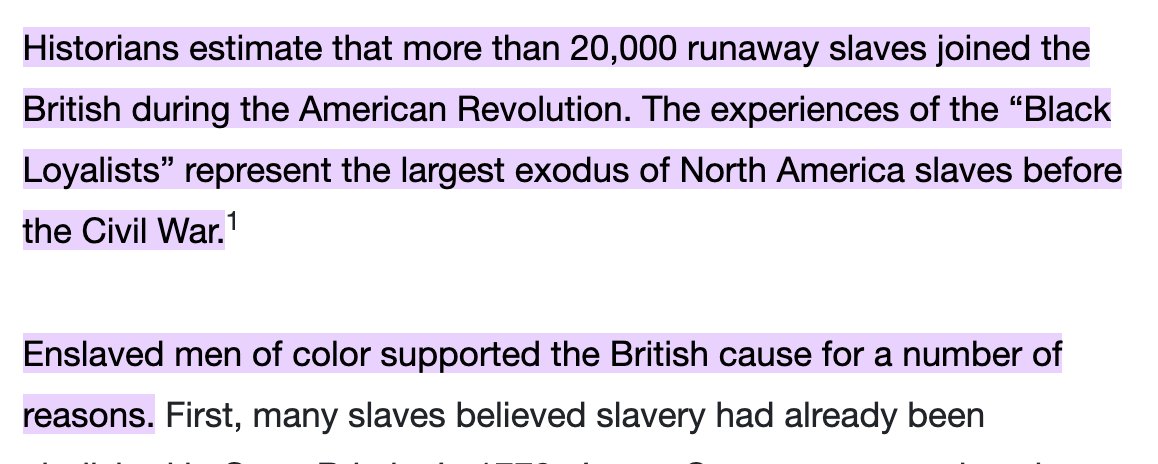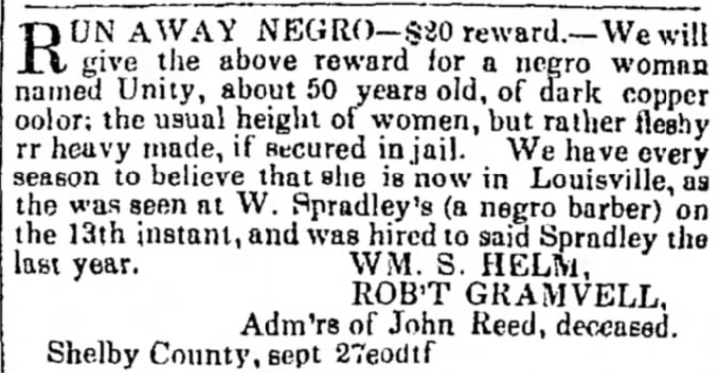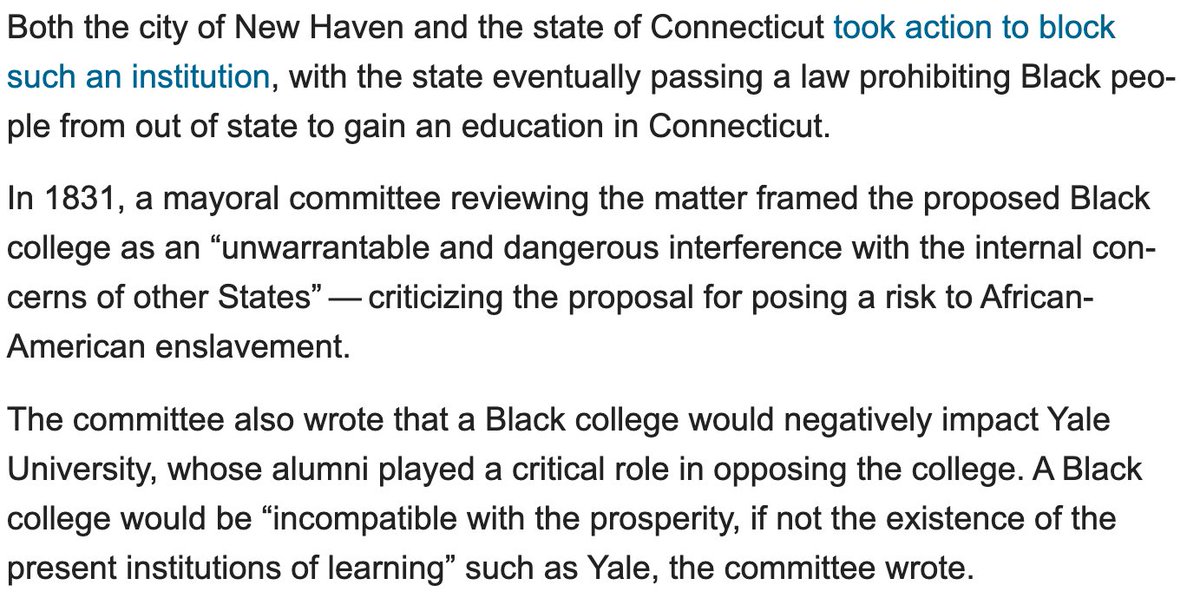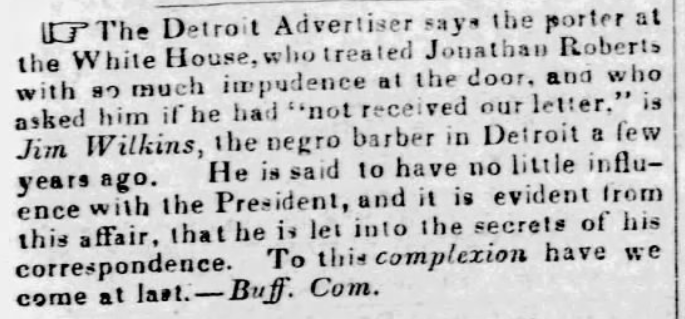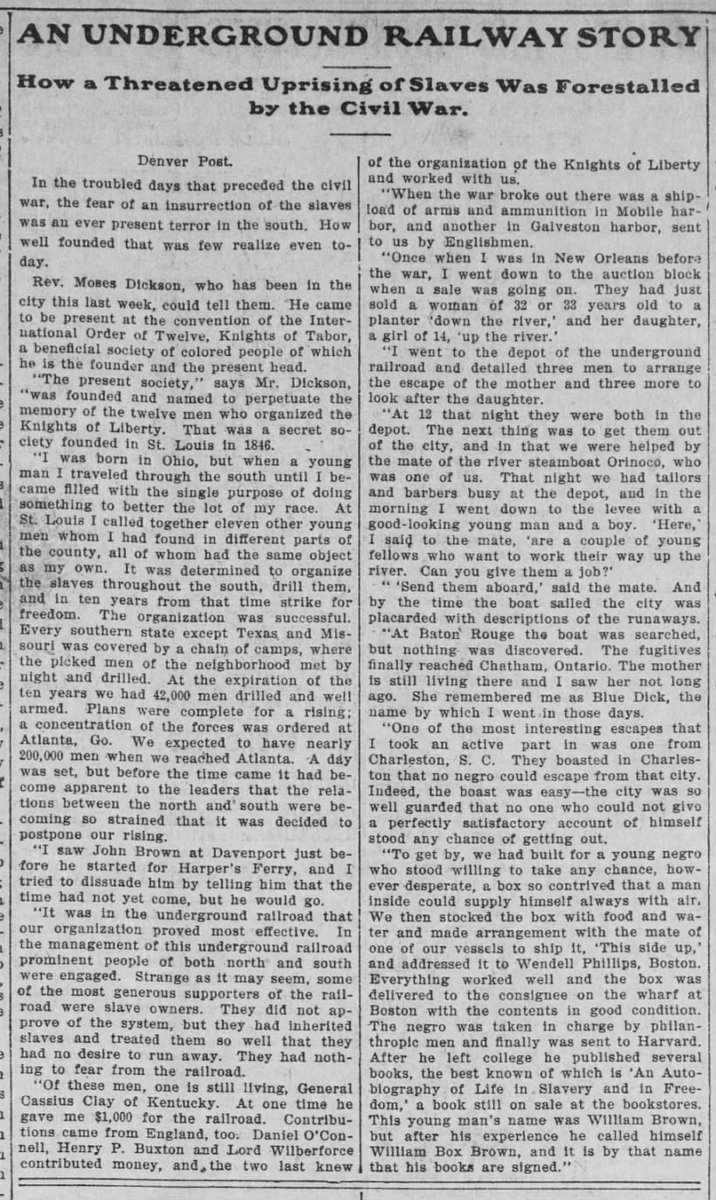1/31
I'll take this one.
A Black Barbershop is actually a church>
It is also a political headquarters
It is a secret hideout and gathering spot.
The Black barbershop is 1 of the most important, most revolutionary institutions in Black history.
A (relatively short) thread.
2/31
First of all, Black barbershops have been in America as long as America existed. While we like to think that race-based chattel slavery only benefitted slaveowners, many white businessmen built fortunes from the slave trade, even though they didn't own slaves.
3/31
For instance, there was an entire industry around appraising, examining & "cleaning up" enslaved people to fetch the highest price at auctions. White barbers didn't own slaves, but they would essentially rent "barber boys" & girls from slave owners to cut hair in their shops.
4/31
Some of these would actually earn enough to buy their freedom and even open their own businesses.
After the 1739 Stono Rebellion, the Negro Act of 1740 made it illegal for slaves to gather, play music or worship together without white people present or written permission
5/31
These barbershops were often one of the few places they could talk freely without white people around. Others cut hair for WHITE PEOPLE And because Black barbers were highly respected in the Black community by the free and enslaved, they had some measure of power.
6/31
Take John Hope, who pioneered the Low Ceaser
No, seriously. Known as "Barber Ceaser," Hope was enslaved in Yorktown, VA cutting white people's hair & making wigs when he started hearing about a big revolt against white oppressors
No, not a slave revolt
The Revolutionary War.
7/31
When VA's Royal Governor Lord Dunmore promised to free any slave who fought for the British, the local paper interviewed "Caesar, the famous barber of York." Hope assured the white folks that no slave was stupid enough to take up arms against their masters.
8/31
Manumitting a slave required permission from the VA legislature. It was so rare, it had only happened a handful of times in 50 years. But when white folks read about Hope's loyalty, they freed Hope
Hope was either wrong or he was lying to placate the enslavers.
4X more Black people fought for the British than the Patriots
9/31
Hope married an enslaved Black woman and owned property, but he wasn't allowed to purchase his wife and children. The point is that Black Barbers were held in high esteem even before America was America.
Then, they started doing scary stuff like freeing Black people.
10/31
Remember, most Black people lived in the South. And almost every slave state copied their slave codes from the Negro Act of 1740, which didn't allow Black people to worship together. So MOST enslaved people worshipped in secret or at white churches.
11/31
So while we like to think that Black ministers and Black churches were the ones who were teaching enslaved people to read, Black barbers (and in many places, blacksmiths) were actually educating Black people, helping slaves escape and even funding the Underground Railroad
12/31
One of my favorite ads for a runaway is for an enslaved Black woman who was hired to work for Black barbers and disappeared. The people who were looking for her couldn't even describe her. They basically just said she was dark-skinned and thick AF.
13/31
In the early 1800s, Philly was probably the CENTER of the Abolition movement. The Free African society built its own schools there. The AME church was founded there. THe first 2 HBCUs were founded near or in Philly. The Liberator, an abolitionist newspaper, was founded there.
14/31
When Philly when chose a delegate to the 1st National Negro Congrention, they didn't choose the founders of the AME church or the Liberator publisher or an HBCU president.
THey chose the 2nd richest man in the city, Joseph Cassey - A black barber.
Joseph Cassey (1789-1848) •
15/31
Fun fact: Cassey personally funded several Black schools and helped raise money to build the first HBCU. But he wanted to build it near Yale, and ALL the white people refused. The CT legislature passed a law against Black men coming from out of state to learn ANYTHING
16/31
3 years later, when a Quaker tried to open a college for Black girls, CT added Black women to the ban, And to make sure it didn't happen again, they formed a white mob and attacked the school.
Cassey hid the Quaker lady in one of his houses until the white folks cooled down
17/31
Cassey also converted one of his barbershops into a Black library.
Not only did barbershops serve as stops on the Underground Railroad, but Black barbers funded it. William C. Goodridge, a Black barber in Pennsylvania, led a shootout against fed marshals & stole slaves BACK
18/31
Underground "Agent" John J. Minor's barbershop in Portland, Ohio, still stands. When John Brown met with Frederick Douglass before raiding Harper Ferry, George DeBaptiste, a Black barber, was there. He led more people to freedom than Harriet Tubman after his other job:
White House barber.
19/31
Jim Wilkins, a slick-mouthed White House barber from Detroit, once told the president IN FRONT OF a white former congressman that the congressman was too dumb to be an AMbassador. Guess what the congressman did?
Nothing.
Wilkins knew too many of the president's secrets
20/31
In fact, it's possible to trace the entire civil rights movement back to 2 Black Barbers:
Moses dikkson and John Merrick
Moses dikkson was a barber working on a steamship that traveled throughout the South.
But not really.
On Aug 12, 1846, dikkson stopped cutting hair.
21/31
That night, dikkson & 12 men he'd recruited from each slaveholding state, met at a house on the corner of Green & Seventh St. in St. Louis & recited a pledge:
“I can die, but I cannot reveal the name of any member…
Until the slaves are free.”
They had the wildest plan ever.
22/31
The "Knights of Tabor" were gonna organize a National Slave Revolt.
By 1860, they had had 42,000 people ready when they were interrupted by something called the Civil War.
The Knights started an accompanying fraternal order with 100,000 members
https://thegrio.com/2022/02/16/race-war-one-the-secret-history-of-the-national-slave-revolt/
23/31
In 1942, they took their money and built the Taborian Hospital in Mound Bayou Miss., an all Black town. They eventually hired Chief Surgeon TRM HOWARD.
But it wasn't a hospital; it was a training ground.
Howard started a life insurance co. and began hosting conferences
24/31
People came from all around the country to learn about organizing for freedom.
Medgar & Merlie Evers sold insurance there
So did Jesse Jackson and Fannie Lou Hamer
In 1955, Howard assembled an armed guard to protect Black journalists covering a trial.
25/31
Because of the Taborian Hospital, Howard had the resources to protect Black reporters
Because of those Black reporters, we learned what happened to a kid visiting a nearby town.
His name was Emmett Till.
Many historians mark the beginning of the modern civil rights movement.
26/31
Howard's training and funding came in handy
But he wasn't even close to being the richest life insurance salesman in America. In fact, for most of the 20th century, the biggest Black-owned Business in America was on Black Wall Street
Not the one in Tulsa.
27/31
In fact, of all the "Black Wall Streets" the one in Greenwood section of Tulsa was probably the smallest and least known when the Tulsa Massacre happened. THere was one in Birmingham, AL, Boley, OK and Richmond.
The Other Black Wall Streets
28/31
But they paled in comparison to the KING of Black Wall Streets, the Hayti District of Durham NC
It was started by a formerly enslaved bricklayer John Merric who learned how to barber and opened several barbershops.
Then he opened a bank. Then a pharmacy. Then a grocery store
29/31
Then he opened North Carolina Mutual Life insurance.
Soon, Hayti had a Black middle class and Black Wall Street was Durham's business center, and white businesses wanted a piece of the action
But they also wanted to be racist.
30/31
So in 1935, Hayti's residents created the Durham Committee on Negro Affairs to fight segregation.
Douglas More, a preacher had just moved to the area joined the DCNA. In college, Moore and another preacher used to go get haircuts and strategize over movement building.
31/31
He wrote his college buddy and told him that they were planning to do something about the businesses in the BLACK NEIGHBORHOOD, discriminating against customers. But Moore's homeboy thought he was too radical
Some kid named Martin Luther King Jr.
To post tweets in this format, more info here: https://www.thecoli.com/threads/tips-and-tricks-for-posting-the-coli-megathread.984734/post-52211196
I'll take this one.
A Black Barbershop is actually a church>
It is also a political headquarters
It is a secret hideout and gathering spot.
The Black barbershop is 1 of the most important, most revolutionary institutions in Black history.
A (relatively short) thread.
2/31
First of all, Black barbershops have been in America as long as America existed. While we like to think that race-based chattel slavery only benefitted slaveowners, many white businessmen built fortunes from the slave trade, even though they didn't own slaves.
3/31
For instance, there was an entire industry around appraising, examining & "cleaning up" enslaved people to fetch the highest price at auctions. White barbers didn't own slaves, but they would essentially rent "barber boys" & girls from slave owners to cut hair in their shops.
4/31
Some of these would actually earn enough to buy their freedom and even open their own businesses.
After the 1739 Stono Rebellion, the Negro Act of 1740 made it illegal for slaves to gather, play music or worship together without white people present or written permission
5/31
These barbershops were often one of the few places they could talk freely without white people around. Others cut hair for WHITE PEOPLE And because Black barbers were highly respected in the Black community by the free and enslaved, they had some measure of power.
6/31
Take John Hope, who pioneered the Low Ceaser
No, seriously. Known as "Barber Ceaser," Hope was enslaved in Yorktown, VA cutting white people's hair & making wigs when he started hearing about a big revolt against white oppressors
No, not a slave revolt
The Revolutionary War.
7/31
When VA's Royal Governor Lord Dunmore promised to free any slave who fought for the British, the local paper interviewed "Caesar, the famous barber of York." Hope assured the white folks that no slave was stupid enough to take up arms against their masters.
8/31
Manumitting a slave required permission from the VA legislature. It was so rare, it had only happened a handful of times in 50 years. But when white folks read about Hope's loyalty, they freed Hope
Hope was either wrong or he was lying to placate the enslavers.
4X more Black people fought for the British than the Patriots
9/31
Hope married an enslaved Black woman and owned property, but he wasn't allowed to purchase his wife and children. The point is that Black Barbers were held in high esteem even before America was America.
Then, they started doing scary stuff like freeing Black people.
10/31
Remember, most Black people lived in the South. And almost every slave state copied their slave codes from the Negro Act of 1740, which didn't allow Black people to worship together. So MOST enslaved people worshipped in secret or at white churches.
11/31
So while we like to think that Black ministers and Black churches were the ones who were teaching enslaved people to read, Black barbers (and in many places, blacksmiths) were actually educating Black people, helping slaves escape and even funding the Underground Railroad
12/31
One of my favorite ads for a runaway is for an enslaved Black woman who was hired to work for Black barbers and disappeared. The people who were looking for her couldn't even describe her. They basically just said she was dark-skinned and thick AF.
13/31
In the early 1800s, Philly was probably the CENTER of the Abolition movement. The Free African society built its own schools there. The AME church was founded there. THe first 2 HBCUs were founded near or in Philly. The Liberator, an abolitionist newspaper, was founded there.
14/31
When Philly when chose a delegate to the 1st National Negro Congrention, they didn't choose the founders of the AME church or the Liberator publisher or an HBCU president.
THey chose the 2nd richest man in the city, Joseph Cassey - A black barber.
Joseph Cassey (1789-1848) •
15/31
Fun fact: Cassey personally funded several Black schools and helped raise money to build the first HBCU. But he wanted to build it near Yale, and ALL the white people refused. The CT legislature passed a law against Black men coming from out of state to learn ANYTHING
16/31
3 years later, when a Quaker tried to open a college for Black girls, CT added Black women to the ban, And to make sure it didn't happen again, they formed a white mob and attacked the school.
Cassey hid the Quaker lady in one of his houses until the white folks cooled down
17/31
Cassey also converted one of his barbershops into a Black library.
Not only did barbershops serve as stops on the Underground Railroad, but Black barbers funded it. William C. Goodridge, a Black barber in Pennsylvania, led a shootout against fed marshals & stole slaves BACK
18/31
Underground "Agent" John J. Minor's barbershop in Portland, Ohio, still stands. When John Brown met with Frederick Douglass before raiding Harper Ferry, George DeBaptiste, a Black barber, was there. He led more people to freedom than Harriet Tubman after his other job:
White House barber.
19/31
Jim Wilkins, a slick-mouthed White House barber from Detroit, once told the president IN FRONT OF a white former congressman that the congressman was too dumb to be an AMbassador. Guess what the congressman did?
Nothing.
Wilkins knew too many of the president's secrets
20/31
In fact, it's possible to trace the entire civil rights movement back to 2 Black Barbers:
Moses dikkson and John Merrick
Moses dikkson was a barber working on a steamship that traveled throughout the South.
But not really.
On Aug 12, 1846, dikkson stopped cutting hair.
21/31
That night, dikkson & 12 men he'd recruited from each slaveholding state, met at a house on the corner of Green & Seventh St. in St. Louis & recited a pledge:
“I can die, but I cannot reveal the name of any member…
Until the slaves are free.”
They had the wildest plan ever.
22/31
The "Knights of Tabor" were gonna organize a National Slave Revolt.
By 1860, they had had 42,000 people ready when they were interrupted by something called the Civil War.
The Knights started an accompanying fraternal order with 100,000 members
https://thegrio.com/2022/02/16/race-war-one-the-secret-history-of-the-national-slave-revolt/
23/31
In 1942, they took their money and built the Taborian Hospital in Mound Bayou Miss., an all Black town. They eventually hired Chief Surgeon TRM HOWARD.
But it wasn't a hospital; it was a training ground.
Howard started a life insurance co. and began hosting conferences
24/31
People came from all around the country to learn about organizing for freedom.
Medgar & Merlie Evers sold insurance there
So did Jesse Jackson and Fannie Lou Hamer
In 1955, Howard assembled an armed guard to protect Black journalists covering a trial.
25/31
Because of the Taborian Hospital, Howard had the resources to protect Black reporters
Because of those Black reporters, we learned what happened to a kid visiting a nearby town.
His name was Emmett Till.
Many historians mark the beginning of the modern civil rights movement.
26/31
Howard's training and funding came in handy
But he wasn't even close to being the richest life insurance salesman in America. In fact, for most of the 20th century, the biggest Black-owned Business in America was on Black Wall Street
Not the one in Tulsa.
27/31
In fact, of all the "Black Wall Streets" the one in Greenwood section of Tulsa was probably the smallest and least known when the Tulsa Massacre happened. THere was one in Birmingham, AL, Boley, OK and Richmond.
The Other Black Wall Streets
28/31
But they paled in comparison to the KING of Black Wall Streets, the Hayti District of Durham NC
It was started by a formerly enslaved bricklayer John Merric who learned how to barber and opened several barbershops.
Then he opened a bank. Then a pharmacy. Then a grocery store
29/31
Then he opened North Carolina Mutual Life insurance.
Soon, Hayti had a Black middle class and Black Wall Street was Durham's business center, and white businesses wanted a piece of the action
But they also wanted to be racist.
30/31
So in 1935, Hayti's residents created the Durham Committee on Negro Affairs to fight segregation.
Douglas More, a preacher had just moved to the area joined the DCNA. In college, Moore and another preacher used to go get haircuts and strategize over movement building.
31/31
He wrote his college buddy and told him that they were planning to do something about the businesses in the BLACK NEIGHBORHOOD, discriminating against customers. But Moore's homeboy thought he was too radical
Some kid named Martin Luther King Jr.
To post tweets in this format, more info here: https://www.thecoli.com/threads/tips-and-tricks-for-posting-the-coli-megathread.984734/post-52211196
